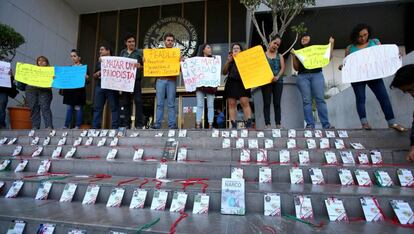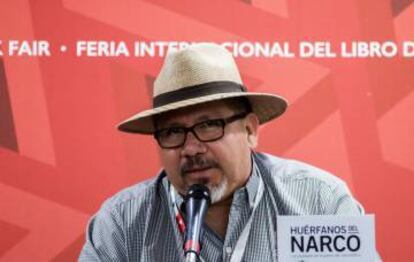“The abnormal has become normal in Mexico”
Angry colleagues of murdered Mexican journalist Javier Valdez march to protest his death
Around 200 journalists in Mexico marched on Tuesday to protest the death of Javier Valdez, a reporter who covered the country’s long-running drug war. He was murdered in broad daylight on Monday in Culiacán, the capital of the strife-torn Mexican state of Sinaloa, which saw 1,161 murders in 2016 and has seen almost half that number in just the first three months of this year.

Valdez, an institution in Mexico and the author of the several books about the violent drug trade in Sinaloa, is the sixth journalist to be murdered in the country this year. His brutal slaying has left his colleagues angry and searching for answers.
“This is a profession that ought to be dignified and respected, but those who govern don’t respect it,” said veteran reporter Jorge Guillermo Cano, director of Vértice magazine, without making it clear whether he was referring to the legitimate government of Sinaloa state or to the drug cartels currently battling it out to fill the power vacuum created by the extradition of kingpin Joaquín “El Chapo” Guzmán to the US in January.
I have to raise my voice so that you know the drug trade is a scourge Javier Valdez, murdered journalist
At the end of their march, during which unseasonable rain fell, the journalists arrived at the headquarters of the regional government. Many were waving banners, while others carried effigies of Valdez. Some called for justice, blaming the governor of Sinaloa, Quirino Ordaz of the Institutional Revolutionary Party, for the reporter’s death.
Another journalist carried a copy of a book by Valdez and read out the following words at the site where he was gunned down: “I write what I see and what I hear. I have to raise my voice so that you know the drug trade is a scourge.”
“It’s a hell of message,” said a renowned Culiacán journalist on Monday of the murder of Valdez, clarifying that the aim of the killing was to spread fear.
On Tuesday, reporters in Culiacán asked themselves whether Valdez had been killed because of something he had written or if someone in the shadowy world of the drug cartels had taken a dislike to him.

It would not be the first time. The Río Doce crime weekly set up by Valdez had already been the target of a fragmentation-grenade attack, while in 2010 gunmen sprayed 57 bullets into the Noroeste newspaper offices in the south of Sinaloa after the publication refused to publish a correction on a story about a shoot-out involving figures from the drug world.
Whatever the reason for the murder of Valdez – who in 2011 won an International Press Freedom Award from the Committee to Protect Journalists – his death comes in the context of escalating violence in Sinaloa. The sons of El Chapo are currently fighting it out with a group led by Dámaso López, a former partner of the extradited drug boss, for motives that remain unclear, but which could include control of the drug routes north or a battle of perception as the two sides try to position themselves before the authorities as a means of boosting their bargaining power.
We don’t know if we have hit rock bottom or not
Rosa María Rios, ‘Vértice’ magazine
What is certain, however, is that the two sides have crossed swords in the media with accusations even appearing in national news outlets. It could be that someone said something that someone else didn’t like.
But for Rosa María Rios at Vértice, the murder of Valdez does not break any code or even set a new tone. “The codes were broken years ago. Everyday people on the street are being affected and we don’t know if we have hit rock bottom or not,” she said.
“The abnormal has become normal,” added her boss Cano.
English version by George Mills.
Tu suscripción se está usando en otro dispositivo
¿Quieres añadir otro usuario a tu suscripción?
Si continúas leyendo en este dispositivo, no se podrá leer en el otro.
FlechaTu suscripción se está usando en otro dispositivo y solo puedes acceder a EL PAÍS desde un dispositivo a la vez.
Si quieres compartir tu cuenta, cambia tu suscripción a la modalidad Premium, así podrás añadir otro usuario. Cada uno accederá con su propia cuenta de email, lo que os permitirá personalizar vuestra experiencia en EL PAÍS.
¿Tienes una suscripción de empresa? Accede aquí para contratar más cuentas.
En el caso de no saber quién está usando tu cuenta, te recomendamos cambiar tu contraseña aquí.
Si decides continuar compartiendo tu cuenta, este mensaje se mostrará en tu dispositivo y en el de la otra persona que está usando tu cuenta de forma indefinida, afectando a tu experiencia de lectura. Puedes consultar aquí los términos y condiciones de la suscripción digital.









































